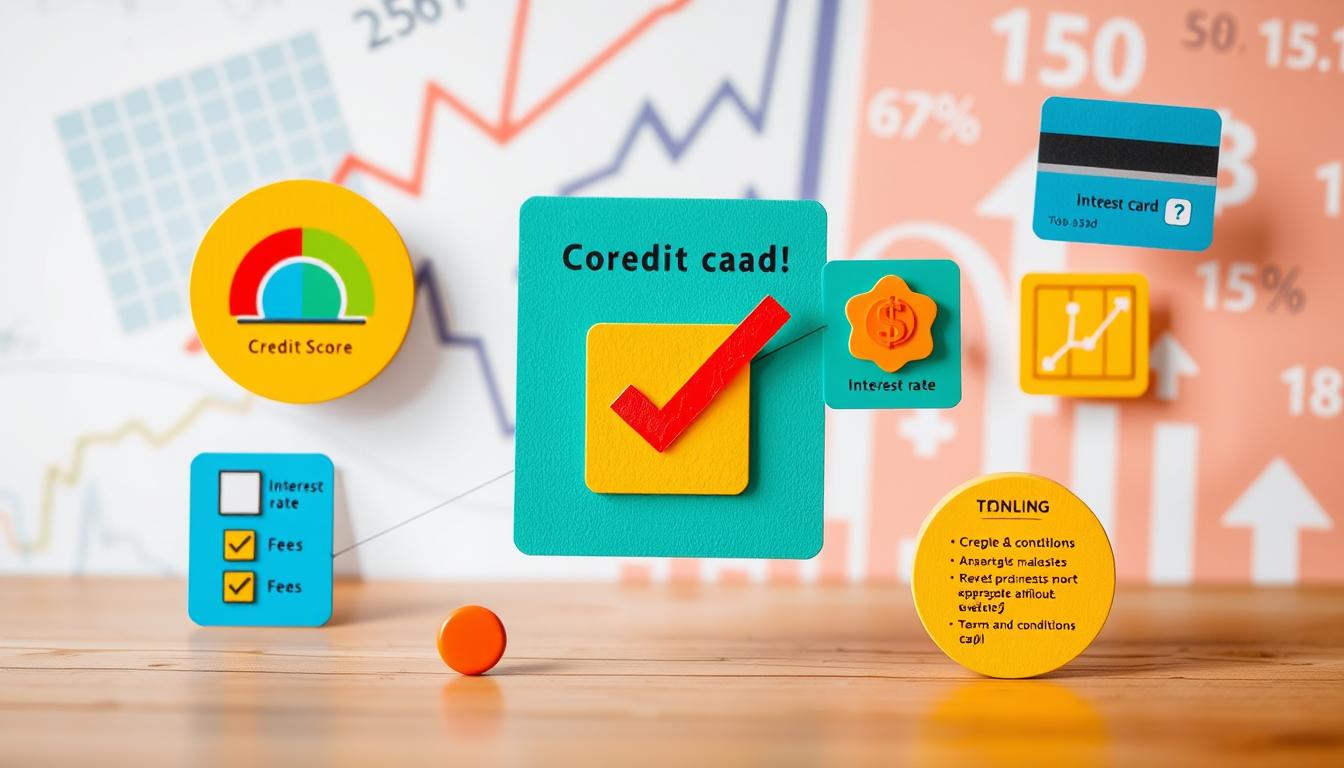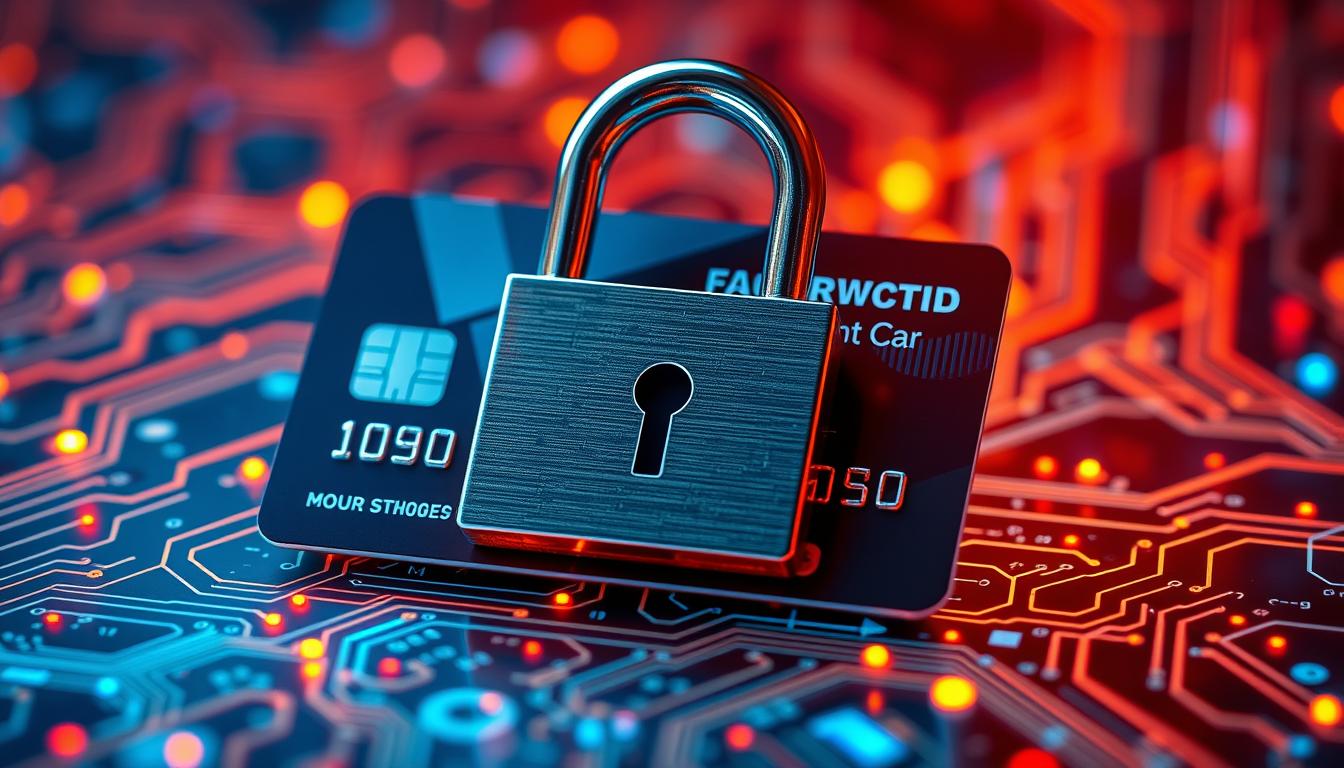Applying for a credit card can boost your financial management and credit history. It opens doors to purchases, credit building, and exciting rewards. This guide explores credit card types, benefits, and key factors for choosing the right one.
We’ll outline the application process step-by-step. You’ll also learn tips for managing credit card debt effectively. Finally, we’ll share strategies to build and improve your credit score.
Key Takeaways
- Applying for a credit card can help you manage your finances and build your credit history.
- There are various types of credit cards, each with its own benefits and features.
- Factors to consider when choosing a credit card include annual fees, interest rates, rewards programs, and more.
- The credit card application process involves gathering required documents and choosing the right card for your needs.
- Responsible credit card usage, including budgeting and on-time payments, is crucial for managing debt and improving your credit score.
Understanding the Importance of Credit Cards
Credit cards are essential in modern financial life. They offer many benefits to cardholders. These plastic companions have changed how we handle our money.
Credit cards enable convenient transactions. They also provide access to emergency funds. This has transformed the way we manage our finances.
Types of Credit Cards
The credit card market caters to various financial needs. Traditional credit cards are the most common type. They allow users to make purchases and build credit history.
Secured credit cards are for people with limited or poor credit. These cards require a refundable security deposit. Specialty cards offer unique perks for specific spending habits.
Travel rewards cards and cash-back cards are examples of specialty cards. They tailor benefits to different lifestyle preferences.
Benefits of Having a Credit Card
- Building Credit History – Responsible credit card use can improve your credit score. This opens doors to better loan rates and financial opportunities.
- Earning Rewards – Many cards offer rewards programs like cash back or points. Cardholders can earn benefits on their everyday purchases.
- Accessing Emergency Funds – Credit cards can be a financial safety net. They provide access to funds in unexpected situations or tight cash flow.
Understanding credit card types helps make informed decisions. Choose a card that suits your financial needs and goals. Responsible use can be a powerful tool for managing finances.
Credit cards can help build a strong credit profile. This is crucial for future financial opportunities. Use them wisely to reap their full benefits.
Factors to Consider When Applying for a Credit Card
Choosing the right credit card is crucial for your financial well-being. Several factors can help you find a card that matches your needs. Let’s explore key points to remember when applying for a credit card.
Annual Fee
Check the annual fee of the credit card. Fees can range from zero to hundreds of dollars. Make sure the card’s benefits justify any annual fee.
Interest Rate
The Annual Percentage Rate (APR) affects the cost of carrying a balance. A lower APR can save you money on interest charges. This is especially important if you often carry a balance.
Rewards Program
Many cards offer rewards like cash back, points, or miles. Look at earning rates and redemption options. Choose a program that fits your spending habits and lifestyle.
Choosing a card with a rewards program that complements your lifestyle can be a significant perk.
Credit Limit
Consider the maximum amount of credit you’ll receive. A higher limit offers more financial flexibility. It can also improve your credit utilization ratio, which affects your credit score.
Introductory Offers
Some issuers provide 0% APR periods or sign-up bonuses. These offers can be beneficial. However, always read the fine print and understand the terms.
By weighing these factors, you can choose a card that fits your needs. Responsible use of credit cards can help build a healthy credit profile.

Step-by-Step Guide to Applying for a Credit Card
Applying for a credit card doesn’t have to be scary. With good prep, you can breeze through the process. This guide will help you apply for a credit card successfully.
Gathering Required Documents
Start by collecting the necessary documents and info. You’ll need your full legal name and date of birth. Your Social Security number is also required.
Provide your current home address and any previous ones. Include your job title, employer’s name, and yearly income. Also, list your monthly rent or mortgage and other debts or assets.
Having these details ready will make your application smoother. It ensures you give accurate info to the credit card company.
Choosing the Right Credit Card
There are many credit card options out there. Think about your needs and spending habits before picking one. Consider these factors when choosing a credit card:
- Annual fees: Look for a card with no annual fee or a first-year waiver.
- Interest rates: A low-interest card is better if you might carry a balance.
- Rewards and perks: Frequent travelers or big spenders can benefit from rewards cards.
- Credit card network: Visa, Mastercard, American Express, and Discover each have unique strengths.
Take time to understand the credit card application process. Select the right card for your needs. This way, you’ll get the most benefits from your new credit card.
Tips for Managing Credit Card Debt
Controlling credit card debt is vital for your financial health. Smart strategies can help you pay off debt and regain stability. Effective debt management leads to improved financial well-being.
Here are some practical tips to help you tackle credit card debt:
- Make more than the minimum payment each month. Paying extra, even if it’s a small amount, can help you reduce your debt faster and save on interest charges.
- Prioritize high-interest debt. Focus on paying off the credit cards with the highest interest rates first, as this will help you save the most money in the long run.
- Create a budget and monitor your spending. Carefully tracking your expenses can help you identify areas where you can cut back and allocate those funds towards debt repayment.
Consider balance transfer offers or debt consolidation loans. These options can simplify payments and potentially lower interest rates. This approach may help you pay off credit card debt more efficiently.
Avoid new debt while paying off existing balances. Discipline and commitment to financial responsibility are crucial. These habits will help you successfully manage credit card debt.
“The key to successful debt management is to create a plan and stick to it. Small, consistent steps can make a big difference in the long run.”

Building and Improving Your Credit Score
Your credit score is vital for determining your creditworthiness. It affects the terms you’ll get when applying for credit cards or loans. Two key parts of your credit score are your credit utilization ratio and payment history.
Understanding these factors can help you build a better credit score. By managing them well, you can improve your score over time.
Credit Utilization Ratio
This ratio measures how much of your available credit you’re using. Experts say keeping it below 30% helps maintain a good credit score. To improve this ratio, pay down your credit card balances.
Avoid maxing out your cards. This will help keep your credit utilization low.
Payment History
Your payment history shows if you pay your bills on time. It’s the most important part of your credit score. Always make payments by the due date.
Set up automatic payments or reminders. This will help you avoid missing any due dates.
“Building and maintaining a good credit score takes time and discipline, but it’s well worth the effort. By keeping your credit utilization low and making all payments on time, you can steadily improve your creditworthiness and access better financing options.”
Improving your credit score takes time. Focus on these key factors to enhance your credit profile. With patience and effort, you can build a stronger credit score.
Aanvragen Credit Card: The Application Process
Applying for a credit card is simple when you know the steps. Gather your personal ID, income info, and credit history first. These documents are key for the credit card application process.
You can apply online, by phone, or at a bank branch. You’ll need to share details about your finances. This includes your job, monthly income, and any debts you have.
- Gather the required documents: Personal identification, such as a driver’s license or passport, and information about your income and existing credit history.
- Choose the right credit card: Research different credit card options and select the one that best fits your needs and financial profile.
- Complete the application: Provide the credit card issuer with all the necessary information, either online, by phone, or in person.
- Wait for a decision: The credit card issuer will review your application and credit information to determine if you qualify and the terms they can offer you.
- Receive your new credit card: If your application is approved, you’ll receive your new credit card and can begin using it for purchases, balance transfers, or cash advances.
The process may differ slightly between card issuers. Being ready with all your info can boost your chances of approval. Soon, you’ll be enjoying your new credit card benefits.
| Step | Description |
|---|---|
| Gather Documents | Collect personal identification, income information, and credit history details. |
| Choose a Credit Card | Research and select the credit card that best suits your needs and financial profile. |
| Complete Application | Provide the credit card issuer with all the required information, either online, by phone, or in person. |
| Wait for Decision | The credit card issuer will review your application and credit information to determine your eligibility and terms. |
| Receive New Card | If approved, you’ll receive your new credit card and can start using it for various transactions. |
Following these steps will help you get a new credit card. Choose one that fits your financial needs and goals. Start your credit card application process today!

Rewards and Perks of Credit Card Ownership
Credit cards offer more than just a way to make purchases. Many issuers provide valuable rewards programs with tangible benefits. Two popular types are cash back rewards and travel rewards.
Cash Back Rewards
Cash back rewards let you earn a percentage of your purchases back. This can offset everyday spending costs. Some cards offer up to 5% cash back on categories like groceries, gas, or dining out.
By using a cash back credit card strategically, you can maximize value from your normal spending habits.
Travel Rewards
Travel rewards credit cards can be a game-changer for travel enthusiasts. These cards typically earn points or miles for each dollar spent. You can redeem these for flights, hotel stays, rental cars, and other travel expenses.
Some programs let you transfer rewards to airline or hotel loyalty programs. This provides even more flexibility. Choose a card that matches your travel preferences to unlock valuable perks.
| Reward Type | Earning Rate | Redemption Options |
|---|---|---|
| Cash Back | 1-5% of purchases | Statement credits, direct deposit, gift cards |
| Travel | 1-5 points/miles per dollar spent | Flights, hotel stays, rental cars, experiences |
Choose a credit card that offers rewards you value most. This helps maximize benefits and enjoy perks that enhance your financial well-being.
Credit Card Security and Fraud Protection
Protecting your financial information is crucial in our digital world. Credit card issuers have implemented various measures to shield cardholders. These safeguards help prevent security threats and provide fraud protection.
EMV chip technology is a major advancement in credit card security. It creates a unique code for every purchase, making card replication nearly impossible. This technology effectively prevents counterfeit fraud.
Credit card providers use real-time transaction monitoring to spot suspicious activity. They’ll notify you promptly if they detect unusual charges. This allows you to take immediate action to secure your account.
Most credit card companies offer a $0 fraud liability guarantee. This means you’re not responsible for fraudulent charges on your card. It provides peace of mind and financial protection.
Many cards offer enhanced security features like account freezing options. Some also provide virtual card numbers for online transactions. These tools give you more control over your financial information.
Understanding your card’s security measures helps protect your finances. It also reduces the risk of credit card fraud. Using these tools can greatly enhance your financial security.
| Security Feature | Description |
|---|---|
| EMV Chip Technology | Generates a unique transaction code for every purchase, preventing counterfeit fraud. |
| Real-Time Transaction Monitoring | Detects suspicious activity and promptly notifies the cardholder. |
| $0 Fraud Liability Guarantee | Ensures cardholders are not responsible for any fraudulent charges on their account. |
| Account Locking/Freezing | Provides cardholders the ability to temporarily lock or freeze their account for added security. |
| Virtual Card Numbers | Generates a unique card number for online transactions, protecting the primary account number. |

Use these security features to protect your financial information. They can help you reduce risks linked to credit card fraud. Stay proactive in safeguarding your finances.
Responsible Credit Card Usage
Using credit cards responsibly is key to financial health and a strong credit history. Good budgeting and spending habits are vital. These practices help you reap benefits while avoiding risks.
Budgeting and Spending Habits
Start with a detailed budget to use credit cards wisely. Track your income, expenses, and spending patterns. This helps you stay within your means and avoid unnecessary debt.
Be mindful of your spending habits. Avoid impulse buys and use your credit card selectively. Keep your balances low compared to your credit limit.
- Develop a detailed budget to track income and expenses
- Avoid impulse purchases and be selective with credit card use
- Maintain a low credit utilization ratio to improve your credit score
“Responsible credit card usage is not just about making payments on time, but also about developing a healthy relationship with your credit.”
Responsible credit card usage helps you build a strong credit history. It also provides long-term financial stability. Practice good habits to enjoy credit card benefits safely.
Conclusion
Applying for a credit card is a crucial step in your financial journey. Understanding different card types and benefits helps you make an informed decision. Choosing the right card empowers you to build or improve your credit score.
Follow best practices for managing credit card debt and protecting your financial information. Use your credit card responsibly to enjoy financial flexibility and rewarding opportunities. With the right approach, you can take control of your financial future.
The right credit card can be a powerful asset for establishing credit or earning rewards. By making informed decisions, you can improve your financial stability and achieve long-term success.
FAQ
What types of credit cards are available?
What are the benefits of having a credit card?
What factors should I consider when applying for a credit card?
What is the process of applying for a credit card?
How can I manage credit card debt effectively?
How can I build and improve my credit score?
What security features do credit cards offer?
FAQ
What types of credit cards are available?
Credit cards come in various types. These include traditional, secured, and specialty cards. Specialty cards offer perks like travel or cash-back rewards.
What are the benefits of having a credit card?
Credit cards offer several advantages. They help build credit history and provide access to emergency funds. Responsible use can also improve your credit score over time.
Many cards offer rewards programs. These can include cash back, travel miles, or points for purchases.
What factors should I consider when applying for a credit card?
When choosing a credit card, consider several key factors. Look at the annual fee, interest rate, and rewards program. Also, check the credit limit and any introductory offers.
What is the process of applying for a credit card?
Applying for a credit card involves a few steps. First, gather your personal and financial information. Then, choose the card that best fits your needs.
Finally, submit your application. You can do this online, by phone, or in person.
How can I manage credit card debt effectively?
Managing credit card debt requires a strategic approach. Pay more than the minimum each month. Prioritize high-interest debt and create a budget to monitor spending.
Consider using balance transfer offers or debt consolidation loans. These can help reduce overall interest payments.
How can I build and improve my credit score?
Two key factors affect your credit score. These are your credit utilization ratio and payment history. Keep your credit utilization low and make all payments on time.
Consistently following these practices will help improve your credit score over time.
What security features do credit cards offer?
Credit card issuers use various security measures. These include EMV chip technology and real-time transaction monitoring. Many also offer
FAQ
What types of credit cards are available?
Credit cards come in various types. These include traditional, secured, and specialty cards. Specialty cards offer perks like travel or cash-back rewards.
What are the benefits of having a credit card?
Credit cards offer several advantages. They help build credit history and provide access to emergency funds. Responsible use can also improve your credit score over time.
Many cards offer rewards programs. These can include cash back, travel miles, or points for purchases.
What factors should I consider when applying for a credit card?
When choosing a credit card, consider several key factors. Look at the annual fee, interest rate, and rewards program. Also, check the credit limit and any introductory offers.
What is the process of applying for a credit card?
Applying for a credit card involves a few steps. First, gather your personal and financial information. Then, choose the card that best fits your needs.
Finally, submit your application. You can do this online, by phone, or in person.
How can I manage credit card debt effectively?
Managing credit card debt requires a strategic approach. Pay more than the minimum each month. Prioritize high-interest debt and create a budget to monitor spending.
Consider using balance transfer offers or debt consolidation loans. These can help reduce overall interest payments.
How can I build and improve my credit score?
Two key factors affect your credit score. These are your credit utilization ratio and payment history. Keep your credit utilization low and make all payments on time.
Consistently following these practices will help improve your credit score over time.
What security features do credit cards offer?
Credit card issuers use various security measures. These include EMV chip technology and real-time transaction monitoring. Many also offer $0 fraud liability guarantees to protect cardholders.
What are the best practices for responsible credit card usage?
Responsible credit card use involves several key habits. Create a budget to track spending and make payments on time each month. Avoid excessive debt and keep balances low.
Be mindful of your credit utilization ratio. This means keeping balances low compared to your available credit limit.
fraud liability guarantees to protect cardholders.
What are the best practices for responsible credit card usage?
Responsible credit card use involves several key habits. Create a budget to track spending and make payments on time each month. Avoid excessive debt and keep balances low.
Be mindful of your credit utilization ratio. This means keeping balances low compared to your available credit limit.
Source Links
- Apply for a Credit Card Online from Discover – https://www.discover.com/credit-cards/
- Credit Cards: Find & Apply for a Credit Card Online at Bank of America – https://www.bankofamerica.com/credit-cards/
- Capital One® Credit Cards – https://www.capitalone.com/credit-cards/

